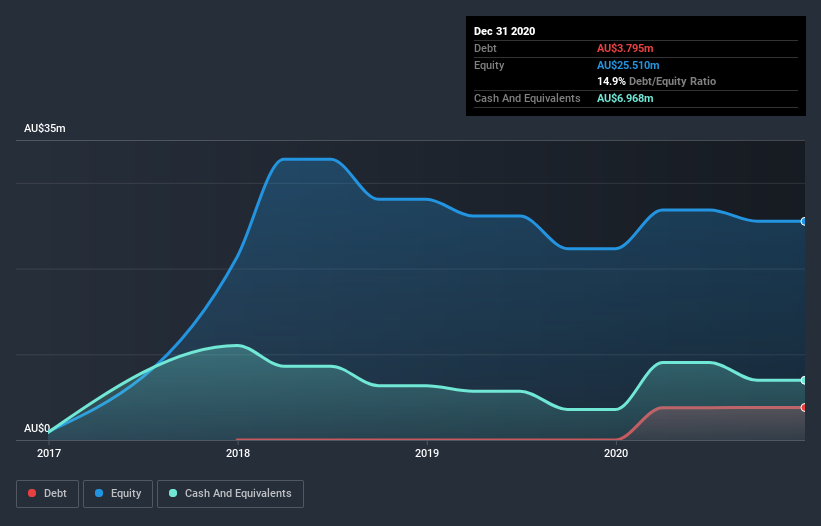
Howard Marks put it nicely when he said that, rather than worrying about share price volatility, 'The possibility of permanent loss is the risk I worry about... and every practical investor I know worries about.' When we think about how risky a company is, we always like to look at its use of debt, since debt overload can lead to ruin. We note that Epsilon Healthcare Limited (ASX:EPN) does have debt on its balance sheet. But is this debt a concern to shareholders?
When Is Debt Dangerous?
Generally speaking, debt only becomes a real problem when a company can't easily pay it off, either by raising capital or with its own cash flow. If things get really bad, the lenders can take control of the business. While that is not too common, we often do see indebted companies permanently diluting shareholders because lenders force them to raise capital at a distressed price. Having said that, the most common situation is where a company manages its debt reasonably well - and to its own advantage. When we think about a company's use of debt, we first look at cash and debt together.
Check out our latest analysis for Epsilon Healthcare
What Is Epsilon Healthcare's Debt?
As you can see below, at the end of December 2020, Epsilon Healthcare had AU$3.79m of debt, up from none a year ago. Click the image for more detail. However, its balance sheet shows it holds AU$6.97m in cash, so it actually has AU$3.17m net cash.

A Look At Epsilon Healthcare's Liabilities
According to the last reported balance sheet, Epsilon Healthcare had liabilities of AU$6.13m due within 12 months, and liabilities of AU$5.20m due beyond 12 months. Offsetting this, it had AU$6.97m in cash and AU$1.53m in receivables that were due within 12 months. So its liabilities outweigh the sum of its cash and (near-term) receivables by AU$2.83m.
Given Epsilon Healthcare has a market capitalization of AU$37.9m, it's hard to believe these liabilities pose much threat. However, we do think it is worth keeping an eye on its balance sheet strength, as it may change over time. While it does have liabilities worth noting, Epsilon Healthcare also has more cash than debt, so we're pretty confident it can manage its debt safely. When analysing debt levels, the balance sheet is the obvious place to start. But you can't view debt in total isolation; since Epsilon Healthcare will need earnings to service that debt. So if you're keen to discover more about its earnings, it might be worth checking out this graph of its long term earnings trend.
In the last year Epsilon Healthcare wasn't profitable at an EBIT level, but managed to grow its revenue by 53%, to AU$7.4m. Shareholders probably have their fingers crossed that it can grow its way to profits.
So How Risky Is Epsilon Healthcare?
Statistically speaking companies that lose money are riskier than those that make money. And the fact is that over the last twelve months Epsilon Healthcare lost money at the earnings before interest and tax (EBIT) line. Indeed, in that time it burnt through AU$11m of cash and made a loss of AU$11m. Given it only has net cash of AU$3.17m, the company may need to raise more capital if it doesn't reach break-even soon. Epsilon Healthcare's revenue growth shone bright over the last year, so it may well be in a position to turn a profit in due course. By investing before those profits, shareholders take on more risk in the hope of bigger rewards. When analysing debt levels, the balance sheet is the obvious place to start. However, not all investment risk resides within the balance sheet - far from it. For instance, we've identified 5 warning signs for Epsilon Healthcare (2 are significant) you should be aware of.
At the end of the day, it's often better to focus on companies that are free from net debt. You can access our special list of such companies (all with a track record of profit growth). It's free.
If you decide to trade Epsilon Healthcare, use the lowest-cost* platform that is rated #1 Overall by Barron’s, Interactive Brokers. Trade stocks, options, futures, forex, bonds and funds on 135 markets, all from a single integrated account. Promoted
Valuation is complex, but we're here to simplify it.
Discover if Epsilon Healthcare might be undervalued or overvalued with our detailed analysis, featuring fair value estimates, potential risks, dividends, insider trades, and its financial condition.
Access Free AnalysisThis article by Simply Wall St is general in nature. It does not constitute a recommendation to buy or sell any stock, and does not take account of your objectives, or your financial situation. We aim to bring you long-term focused analysis driven by fundamental data. Note that our analysis may not factor in the latest price-sensitive company announcements or qualitative material. Simply Wall St has no position in any stocks mentioned.
*Interactive Brokers Rated Lowest Cost Broker by StockBrokers.com Annual Online Review 2020
Have feedback on this article? Concerned about the content? Get in touch with us directly. Alternatively, email editorial-team (at) simplywallst.com.
About ASX:EPN
Epsilon Healthcare
Epsilon Healthcare Limited operates as a healthcare and pharmaceuticals company primarily in Australia and Canada.
Medium and slightly overvalued.
Market Insights
Community Narratives



